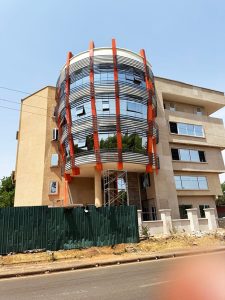
The Minerals Commission of Ghana has decentralised its operations to effectively implement its mandate and ensure maximum efficiency. It has also sent over forty mine inspectors including mining engineers, geo-technical engineers, metallurgists, mechanical engineers, mine surveyors and mineral economists abroad to upgrade their technical skills, knowledge and professional competencies.

The Commission, in the last three years, under the leadership of Chief Executive Officer Mr. Martin Kwaku Ayisi, has been building office complexes across the regions, using internally generated funds to improve access to information and services and to address inefficiencies in its operations.
The Commission’s decentralisation efforts are expected to have a positive impact on the mining sector, leading to increased investment, job creation and economic growth.

Under the Commission’s decentralisation policy, Regional and District offices are to be established and are currently building Regional Mining offices in Kumasi, Tarkwa, Savanna (Bole), Tamale, Wa and Bolgatanga.
The Commission will also establish District offices at Kyebi, Akim Oda, Damang and Bibiani.
Offices in Bibiani and Oda were completed last year, while the Kyebi and Damang Offices are expected to be completed this year, while the Mineral offices in Kumasi, Tarkwa, Savanna and Tamale are under construction.

At Bole in Savanna region, the Office is expected to be completed in April 2025, whereas the New Office for Tarkwa would be ready next year.
The Kumasi Regional Office, which is nearing completion, is an eight-storey ultra-modern and multi-purpose office complex.
Mr. Martin Kwaku Ayisi, the Chief Executive Officer, who disclosed this in an interview with The Chronicle said decentralising the Commission’s operations was crucial for enhancing regulation of the mining sector, emphasising that decentralisation would bring numerous benefits to the minerals industry.
“Decentralization will enable us to provide effective oversight and regulation of mining activities at the regional level,” he stated, adding that “This will lead to improved compliance with mining regulations, reduced environmental degradation, and increased revenue generation for the government.”

According to the CEO, the Commission’s decentralization efforts are expected to bring numerous benefits, including improved access to information and services, enhanced regulation of the mining sector and increased efficiency.
He noted that with offices located across the regions, stakeholders will have easy access to the commission’s services and thus help minimize time and resources of stakeholders in traveling to Accra for services and thus improve the efficiency and effectiveness of Ghana’s mining sector.
Mr. Ayisi noted that the commission’s decentralization efforts are in line with the government’s vision to make the mining sector more transparent, accountable, and beneficial to all stakeholders.
Curbing illegal mining activities
Mr.Ayisi described the decentralisation of operations of the Minerals Commission as a timely intervention aimed at addressing the escalating menace of galamsey in Ghana’s mining areas.
He said the lack of effective regulation and oversight responsibilities over the years has allowed illegal mining activities to thrive, resulting in environmental degradation and loss of revenue for the state.
The CEO noted that with the establishment of regional offices, the Mineral Commission will be better positioned to monitor and regulate mining activities, making it more difficult for galamsey operators to evade detection.
He stated that the presence of Mineral Commission officials in the regions will enable them to engage with local communities and stakeholders more effectively and raise awareness about the dangers of galamsey and the importance of responsible mining practices.
Need for quality mine Inspectors
CEO Ayisi emphasised the need for very high level of quality mine inspectors with knowledge and technical skills to be able to identify potential health and safety hazards as Ghana has investors from some of the biggest mining giants or conglomerates in the world, including such companies like Newmont Mining Corporation, which is the biggest gold producing company in the world, AngloGold Ashanti, Goldfields and now the Chinese giant, Zijin Mining Group, which uses high level of sophistication and technology.
In this circumstance, the Chief Executive believes world class training was, therefore, central to ensuring that our mines were safe and a operating responsibly only when mine inspectors and other technical staff of the Commission are well trained.
According to Mr. Ayisi, building the professional and skills capacity of staff members was also crucial to the success of the Minerals Commission.
“By investing in our staff, we can ensure that they have the skills and expertise needed to effectively regulate the mining sector and support the growth of a responsible and sustainable mining industry,” he stated.
As a result, Mr. Ayisi has disclosed that over 40 mine inspectors including mining engineers, geotechnical engineers, metallurgists, mechanical engineers, mine surveyors, mineral economists have been sent to the USA, Australia and Canada to upgrade their technical skills, knowledge and professional competencies through training in world class mines such as Nevada Gold Mines and Freeport McMoRan in the USA and Northern Star Resources and BHP in Australia among others.
He believes the exposure in working in these mines will expose the mine inspectors to new mining softwares, emerging trends and technology, especially in an industry where robotics, Artificial Intelligence and machine learning are gaining extensive use in the mining sector.
The post MC Sends 40 Mine Inspectors Abroad … For Training To Improve Upon Efficiency …Also Decentralises Operations In Mining Regions appeared first on The Ghanaian Chronicle.
Read Full Story






















Facebook
Twitter
Pinterest
Instagram
Google+
YouTube
LinkedIn
RSS